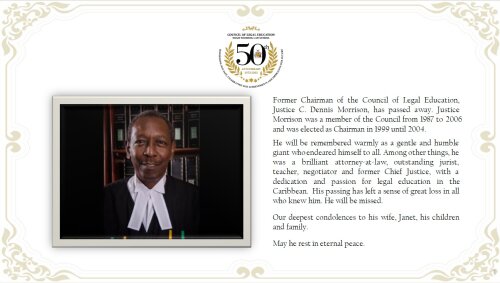Best Permanent Residency Lawyers in Port of Spain
Share your needs with us, get contacted by law firms.
Free. Takes 2 min.
List of the best lawyers in Port of Spain, Trinidad and Tobago
About Permanent Residency Law in Port of Spain, Trinidad and Tobago:
Permanent Residency in Port of Spain, Trinidad and Tobago refers to a legal status that allows foreign nationals to live and work in the country on a permanent basis. It provides individuals with many of the same rights and benefits as citizens, such as the ability to own property, access to healthcare and education, and the opportunity to contribute to the local economy.
Why You May Need a Lawyer:
Seeking legal advice from a lawyer specializing in Permanent Residency is crucial in many situations. Some common scenarios where you may require legal assistance include:
- Understanding the eligibility criteria and application process for Permanent Residency
- Preparing and submitting the necessary documentation accurately and efficiently
- Appealing a decision or addressing issues with your Permanent Residency application
- Seeking advice on maintaining and renewing Permanent Residency status
- Resolving any legal issues or concerns that may arise after obtaining Permanent Residency
Local Laws Overview:
When considering Permanent Residency in Port of Spain, Trinidad and Tobago, it is important to be aware of the following key aspects of local laws:
- Applicants must meet specific eligibility criteria, including financial stability, a clean criminal record, and contributing to the local community
- The application process involves submitting various documents, such as a valid passport, proof of employment or business ownership, and character references
- Permanent Residency grants individuals the right to live, work, and enjoy most benefits of citizens, but it does not provide voting rights
- Failure to comply with the immigration laws or commit serious offenses can result in the revocation of Permanent Residency status
Frequently Asked Questions:
1. Can I apply for Permanent Residency if I am married to a citizen of Port of Spain, Trinidad and Tobago?
Yes, being married to a citizen of Port of Spain, Trinidad and Tobago makes you eligible to apply for Permanent Residency. However, you must meet the other eligibility criteria and provide the necessary documentation to support your application.
2. How long does it generally take to obtain Permanent Residency in Port of Spain, Trinidad and Tobago?
The processing time for Permanent Residency applications can vary. It depends on factors such as the complexity of your case, the workload of the immigration authorities, and the accuracy of your application. It is recommended to consult with a lawyer for more specific information based on your circumstances.
3. Can I work in any field with Permanent Residency in Port of Spain, Trinidad and Tobago?
In general, Permanent Residency grants individuals the freedom to work in any field or occupation of their choice. However, certain professions may have specific licensing or certification requirements that need to be fulfilled before practicing.
4. Do I need to reside in Port of Spain, Trinidad and Tobago continuously to maintain my Permanent Residency status?
No, there is no requirement for continuous residence to maintain your Permanent Residency status. However, prolonged absences from the country without valid reasons may lead to the revocation of your status. It is advisable to stay informed about the specific requirements and obligations to uphold your Permanent Residency.
5. Can Permanent Residency be revoked in Port of Spain, Trinidad and Tobago?
Yes, Permanent Residency can be revoked if the individual violates immigration laws, commits serious offenses, or fails to fulfill the obligations associated with the status. It is important to abide by the local laws and regulations to maintain your Permanent Residency.
Additional Resources:
If you require further information or legal assistance regarding Permanent Residency in Port of Spain, Trinidad and Tobago, the following resources can be helpful:
- Ministry of National Security - Immigration Division: Website providing detailed information on immigration policies and procedures - insert website link here
- Embassy of Trinidad and Tobago: Contact the embassy for guidance and support with Permanent Residency inquiries - insert contact information here
- Law Association of Trinidad and Tobago: Professional organization of lawyers - insert website link here
Next Steps:
If you require legal assistance or have specific questions regarding Permanent Residency in Port of Spain, Trinidad and Tobago, it is recommended to consult with a qualified lawyer specializing in immigration law. They can provide personalized guidance based on your circumstances and help navigate the application process effectively.
Lawzana helps you find the best lawyers and law firms in Port of Spain through a curated and pre-screened list of qualified legal professionals. Our platform offers rankings and detailed profiles of attorneys and law firms, allowing you to compare based on practice areas, including Permanent Residency, experience, and client feedback.
Each profile includes a description of the firm's areas of practice, client reviews, team members and partners, year of establishment, spoken languages, office locations, contact information, social media presence, and any published articles or resources. Most firms on our platform speak English and are experienced in both local and international legal matters.
Get a quote from top-rated law firms in Port of Spain, Trinidad and Tobago — quickly, securely, and without unnecessary hassle.
Disclaimer:
The information provided on this page is for general informational purposes only and does not constitute legal advice. While we strive to ensure the accuracy and relevance of the content, legal information may change over time, and interpretations of the law can vary. You should always consult with a qualified legal professional for advice specific to your situation.
We disclaim all liability for actions taken or not taken based on the content of this page. If you believe any information is incorrect or outdated, please contact us, and we will review and update it where appropriate.














